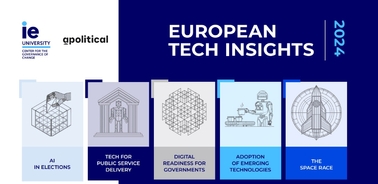- Home
- News And Events
- News
- 67% Of Europeans Fear Ai Manipulation In Elections, According To Ie University Research
67% of Europeans fear AI manipulation in elections, according to IE University research

Two in three (67%) Europeans fear hackers could alter election results, according to latest Tech Insights survey.
IE University’s Center for the Governance of Change (CGC) launched its annual European Tech Insights report, which reveals European citizens' attitudes toward technology and AI-related issues.
As AI continues to be integrated into key areas of government, a significant majority of Europeans (67%) expressed concerns about the potential hacking of elections. The fear of misuse of AI in elections is particularly pronounced in the UK (54%) and Spain (51%). Despite these concerns, the younger generation shows greater openness to AI, with 34% of Europeans under 35 indicating they would trust an AI-powered app to vote for political candidates on their behalf.
The report also highlights public attitudes towards AI's use in public services. 79% of Europeans are comfortable with AI helping job seekers find opportunities, while 77% support its use in optimising city traffic. However, the public remains more cautious about allowing AI to handle personal or legally sensitive matters, such as determining welfare eligibility or processing tax returns.
"Public concern about the role of AI in shaping elections is growing. While there is no clear evidence yet showing significant shifts in election outcomes, AI has heightened concerns about election disinformation and deepfakes on a global scale."
Carlos Luca de Tena, Executive Director at the IE Center for the Governance of Change
Additional insights:
- 31% of Europeans believe AI has already influenced their voting decisions.
- 65% of Europeans are comfortable with AI processing their tax returns, but opposition is higher in the UK (51%).
- Three in four (75%) Europeans support the use of AI in police and military operations such as facial recognition and biometric data for surveillance.
This years’ report has been developed in partnership with Apolitical, and also includes the perspectives of a small sample of public servants.
For more information and to review the full results of the European Tech Insights 2024 report, please click here.
Survey Methodology
The European Tech Insights 2024 survey was conducted through two surveys: one targeting the general population and a second with a qualitative focus on public servants. The general population survey surveyed 3,006 adults spanning 10 countries: Estonia, France, Germany, Italy, the Netherlands, Poland, Romania, Spain, Sweden, and the United Kingdom and were a representative for adults in the countries included, and by gender and age. In the public servants survey, Apolitical initiated a panel among its network members, which includes public servants from over 100 countries.